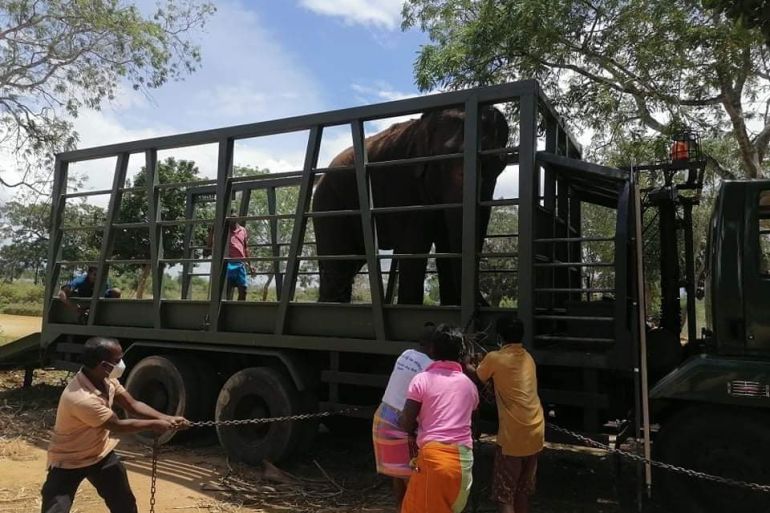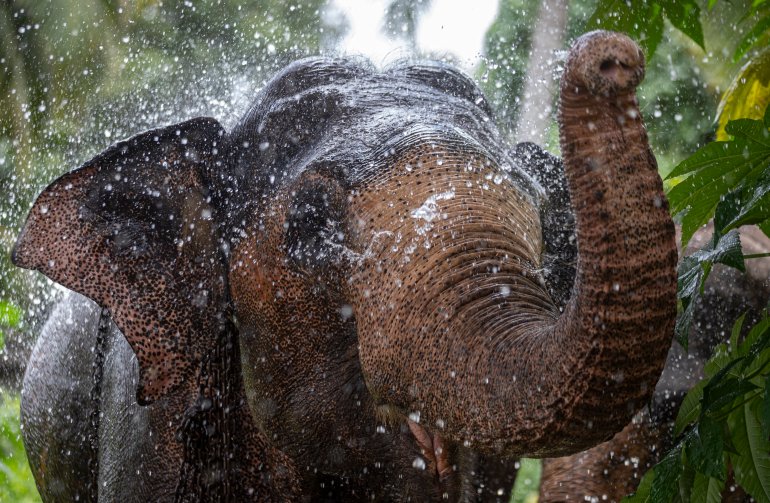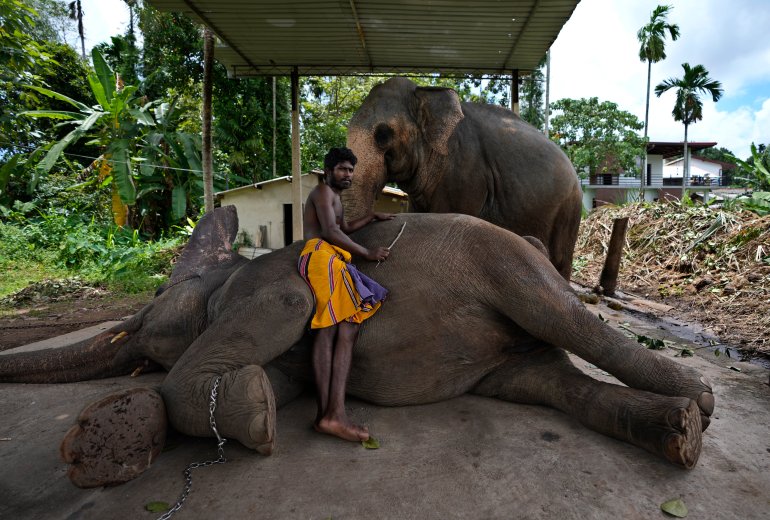Anger as Sri Lanka court returns elephants to alleged traffickers
Court returns more than a dozen elephants in government custody to people who captured them or those who bought the animals from them.

Colombo, Sri Lanka – In a controversial order being widely slammed by conservationists, a Sri Lankan court has upheld an earlier decision to allow the return of 14 elephants in government custody to alleged traffickers who captured them or people accused of buying the animals from them.
Thursday’s decision by Additional Magistrate S Prabakaran was “absolutely arbitrary and the rule of law has been completely ignored”, Aruna Medagoda, the lawyer for the Wildlife and Nature Protection Society, told Al Jazeera.
Keep reading
list of 4 itemsZimbabwe’s elephant culling plan stirs debate
India probes death of 18 Asiatic elephants ‘hit by lightning’
Zimbabwe mulls first mass elephant killing in decades
“The court did not give parties the right to be heard which, contravenes the law and jurisprudence,” Medagoda said.
The court was hearing petitions filed by Sri Lanka’s prominent environmentalists and animal rights groups who had challenged a September 6 order by the same court which allowed the return of the elephants to the alleged traffickers.

The elephants are part of a group of 39 jumbos taken into government custody as evidence in wide-ranging investigations into elephant trafficking between 2010 and 2015.
The traffickers and the people who bought the animals from them were accused of capturing elephant calves in national parks and smuggling them out in the back of vehicles. In many cases, the mothers were killed to capture their calves.
Environmentalists argued the elephants belonged to the state and should therefore remain in government custody. They said they would now go to higher courts.
On August 19, the government issued new regulations, signed by State Minister for Wildlife Protection Wimalaweera Dissanayake, which, critics say, “legalised” animals illegally captured from the wild.
The regulations set out rules requiring “owners” to register their elephants and defined the conditions under which they could be used for work and tourism purposes. Previously, they were allowed only to take part in religious parades, locally called “peraheras”.
The conservationists allege the court’s September 6 order, based on the government’s regulations, violates Sri Lanka’s environmental laws and fear it could lead to a rise in the trafficking of wild elephants.
“The sections on registrations have been included purely to register illegal elephants,” Sumith Pilapitiya, former lead environment specialist at the World Bank and former head of the country’s wildlife department, told Al Jazeera.
Environmental scientist Prithiviraj Fernando echoed the same sentiments.
“If the cases were heard and if it was proved that these elephants were acquired legally, then there is absolutely no problem in releasing them and registering them,” he said.
“But of course, they were taken into custody on the assumption that they were illegally caught. So now if you are allowing them to be registered, doesn’t that say you can illegally capture elephants?”
Commenting on the matter, Dissanayake told Al Jazeera that elephant owners must be required to prove they acquired the animals in a “just manner”.
“Some of these elephants can be illegal, I don’t deny that,” the minister said, adding, “I say there must be changes [to regulations] … let’s say, firstly, the way the elephant was acquired – whether justly and fairly … that must have to be proved.”

A day after the September 6 court order, Ishini Wickramasinghe, director general of Sri Lanka’s zoological department, resigned in protest against the order to release the animals to the people they were taken from by the government.
In a social media post, she talked about the animals she had come to know for years and why their release was wrong.
“Sri Devi is a very loving and affectionate elephant … I was helpless in protecting her and other elephants being forcibly taken away … What cruelty it is to take away their freedom for one’s individual interests?” she wrote on Facebook.
Video clips and photographs of some of the animals being forced onto trucks following the order drew angry responses from people.
“OMG! Heartbreaking,” wrote one. “Wicked people,” said another.
“May all those who are responsible reincarnate as elephants in their next birth and get the same treatment,” said a comment.
Buddhists, who account for 70 percent of Sri Lanka’s 22 million people, consider elephants sacred and owning them prestigious.
Official data shows nearly 100 elephants are in private hands, while about 150 are in government-run centres.